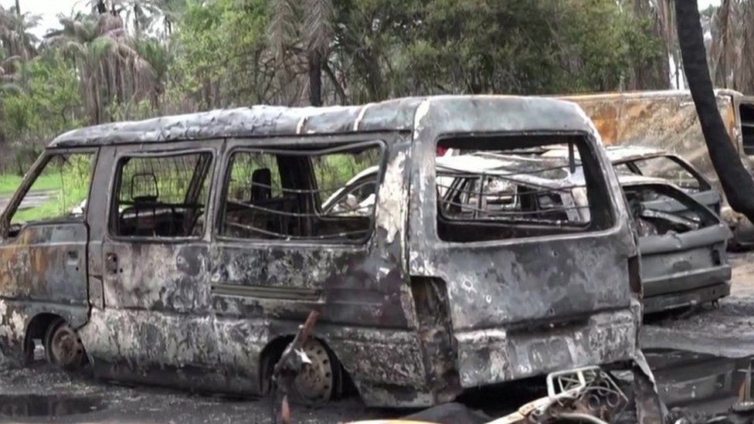Nigeria's president has said the country is in "shock and trauma" following the deaths of at least 100 people from an explosion at an illegal oil refinery.
President Muhammadu Buhari described the incident in Imo state, southern Nigeria, as a "catastrophe and a national disaster".
Many victims were burnt beyond recognition.
The police are now looking for the owner of the illegal refinery.
The damage to fishing and farming caused by the oil industry over the decades and the failure to share the oil wealth has led some to find other ways to make money.
Illegal refining is attractive as in parts of the oil-rich Niger Delta it is seen as being relatively easy to pull off, despite efforts to halt the practice.
Dozens of people were thought to have been working at the refining plants when they were caught in the huge fire.
The death toll has risen as emergency workers go through the scene. Ifeanyi Nnaji of the National Emergency Management Agency told BBC Igbo that the number killed now stood at 109.
"We learnt many bodies are in nearby bushes and forests as some illegal operators and their patrons scampered for safety," he earlier told the AFP news agency.
Charred human remains, as well as fragments of belongings, such as flip flops, bags and clothing, were witnessed across the scene of the disaster by a journalist for the Reuters news agency.
In a statement on Sunday, Mr Buhari offered his condolences to families of the victims and said those responsible for the explosions must be caught and brought to justice.
The authorities have been struggling to curb the proliferation of illegal plants where stolen crude oil is refined. The president ordered security forces to intensify efforts to shut these refineries.
It is not yet clear what caused the explosion that happened sometime overnight into Saturday, but accidents have been common in the past at similar dangerous sites where safety measures are not enforced.
There have been concerns over a lack of precautions at such facilities as well as over the environmental pollution they cause.
But Nigeria's official oil refineries do not work to capacity, causing frequent fuel shortages and price increases across the country.
Latest Stories
-
Dreams FC denies allegations of attempting to sign Najeeb Yakubu
38 mins -
Election 2024: ‘Right to free and fair elections non-negotiable’ – Akufo-Addo
43 mins -
Kurt Okraku took out my passport from the U23 squad that travelled to Japan – Najeeb Yakubu alleges
53 mins -
Where hope fails: Ghana’s decaying home for the destitute
1 hour -
NDC Mining Committee for 2024 campaign refutes allegations of recruiting thugs for elections
1 hour -
Traction Control: A lifesaver with an off switch? Here’s why it exists
1 hour -
I don’t need anyman to woo me with money – Miss Malaika 2024 winner refutes pimping claims
1 hour -
”Kurt Okraku sabotaged my national team career because I refused to sign with Dreams FC” – Najeeb Yakubu
1 hour -
Businesses urged to leverage Generative AI for enhanced customer engagement
1 hour -
MultiChoice Ghana partners with Ghana Hotels Association to elevate guest entertainment
2 hours -
Bawumia’s music streaming app or Mahama’s pay-per-view TV channel?
2 hours -
Karpowership Ghana empowers 40 Takoradi Technical University students with scholarship
2 hours -
We expect significant reduction in prices of petroleum products in coming weeks – CEO AOMC
2 hours -
Betway Africa offers once-in-a-lifetime ‘Play-on-the-Pitch’ experience at Emirates Stadium
2 hours -
I coined the term ‘hype man’ in Ghana – Merqury Quaye
2 hours

